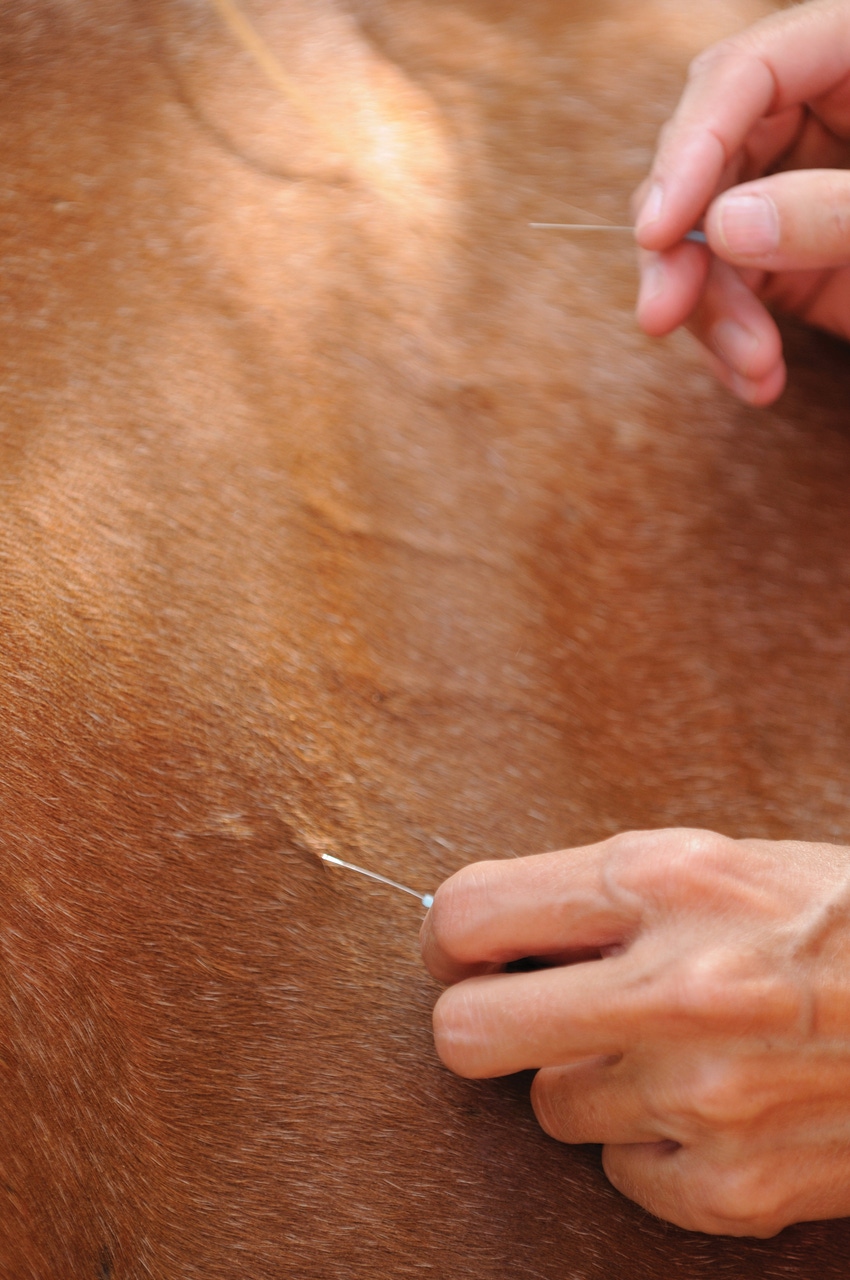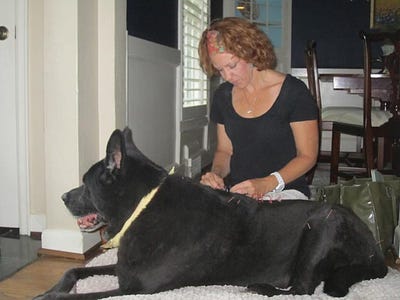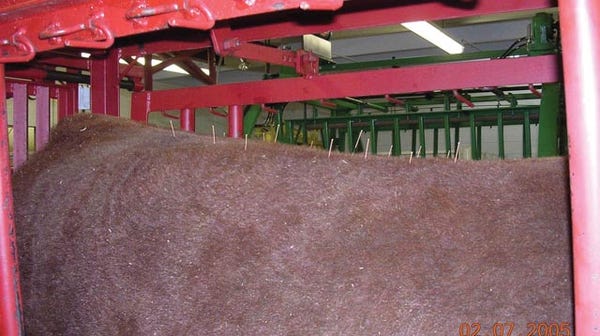Veterinary acupuncture can provide returns to your practice and benefits to your clients.
August 31, 2013

It’s not voodoo. It’s more than simply sticking needles.
Veterinary acupuncture, based on scientific research and measurable results, has proven to be a beneficial and profitable addition to veterinary practices across the country.
Bovine practitioners are also witnessing its effects in cattle herds, as well.
Acupuncture, simply put, is the stimulation of specific points on the body, which can alter various biochemical and physiologic conditions. It is a means of helping the body heal itself.
Tim Holt, DVM, clinical sciences department faculty at Colorado State University (CSU); and Kristol K. Stenstrom, DVM, a private practitioner in Shawnee, KS, have practiced veterinary acupuncture for several years. Their clients couldn’t be happier.
Dr. Holt graduated from veterinary school in 1988, after which he went into private practice in Gunnison, CO. After about a decade of practicing in this rural mountain town, he felt as if he was missing something in the way of therapy.
“I was recommending rest and anti-inflammatories, in some cases, but it ended there,” he says. “I felt like I was missing something. About 15 years ago, with speculation, I took a two week acupuncture course to see what it was. After that course, I began using the practice on animals and realized the success was quite drastic. I got addicted.”
He continued acupuncture training while in private practice. After 18 years, Dr. Holt moved from Gunnison to begin a career with CSU. Today, he teaches acupuncture courses and conducts acupuncture on cattle, horses and other ruminants.
Like what you are reading? Subscribe now to Wes Ishmael's Cattle Market Weekly for price trends and market updates, delivered on Saturdays.
Dr. Stenstrom has practiced veterinary medicine for nearly 20 years in Shawnee. A graduate of Kansas State University, she received her initial training in veterinary acupuncture from CSU in 2003. Today, she instructs other veterinarians in acupuncture, in addition to running her practice.
Because of her close proximity to Kansas City, Dr. Stenstrom says the majority of her acupuncture patients are small animal, with about five percent being comprised of equine and exotic patients. She does, however, treat her own cattle herd with the practice when needed.
She says many misconceptions exist regarding acupuncture and its scientific backing. By understanding the facts, veterinarians and producers can see the benefits.
More Than Needles
Often, people think of traditional Chinese medicine when they think of acupuncture, Dr. Stenstrom says. That is one version—although it’s not the only one.
According to the American Academy of Veterinary Acupuncture (AAVA), original traditional Chinese medicine formed the basis of acupuncture. By needling certain spots on the body, the flow of “Chi,” or energy, is regulated. The result is nourishment of tissues and organs.

Because of her close proximity to Kansas City, Dr. Kristol Stenstrom, a Shawnee, KS, practitioner, says the majority of her acupuncture patients are small animal, with about five percent being comprised of equine and exotic patients. She does, however, treat her own cattle herd with the practice when needed.
Through this theory, horses and cattle have been treated with acupuncture in China and Korea since ancient times.
However, Dr. Stenstrom says, she and many others practice medical acupuncture.
“This form of acupuncture is backed up by research and understanding,” she says. “You can often get the same end result with either form, but we gravitate toward medical acupuncture because we want to understand why it’s working.
“Our Western minds like concrete understanding,” she continues. “If we begin discussing Chinese medicine with agricultural producers, they’ll quite likely tune us out. It is imperative that we speak scientifically, so that they can be confident that it’s beneficial and a scientific practice.”
Dr. Stenstrom says Western acupuncture activates medically identifiable channels of the nervous system, which happen to also be located in the same areas of the Chinese Chi pathways.
“We are stimulating the body to produce neurochemicals,” she explains. “When the needle is placed into the tissue in a specific spot, a number of biochemical changes occur. Signals travel up the spinal cord to the brain, back down again, and changes occur from the brain level.”
Dr. Holt says when the needle is stuck into the anatomically identifiable location, this small area of microtrauma stimulates a healing cascade through a number of vessels and nerves.
“This activates cells that travel through the spinal cord, releasing healing factors and activate pain-blocking mechanisms,” Dr. Holt says. “This also releases endorphins and hormonal chemicals—somewhat of a ‘runner’s high.’”
It might surprise you to know this form of treatment can be used in a variety of ways for cattle, and other animals as well.
Seeing the Benefits
Dr. Holt and Dr. Stenstrom say they have witnessed a variety of conditions improve with the addition of acupuncture to the treatment regimen.
When a cow isn’t rebreeding as she should or is prolapsed; if a bull is losing semen quality or quantity; or if lameness is preventing a bull from doing his job, acupuncture can help, Dr. Stenstrom says.
Dr. Holt says he often performs acupuncture on bulls and heifers or cows for reproductive issues—male infertility, poor libido, decreased sperm production and injuries.
“I also do quite a bit of work on rodeo bulls for injuries, or for tune-ups before a performance,” he says. “It can also work well when wounds aren’t healing.”
Dr. Stenstrom says she most often provides acupuncture as treatment for musculoskeletal and pain issues.
“With dogs, I often treat for arthritis and terminal cancer pain alleviation,” she says. “For horses, it’s often for musculoskeletal issues and lameness. For our cattle, it’s often for scours in calves or reproductive problems in females or bulls.”
However, Dr. Holt says, acupuncture is not the end-all, be-all of medicine.
“It’s important to point out that this is a modality—it doesn’t cure everything,” he says. “But it’s something we can do in addition to our normal Western medicine and compliment the effects of traditional medicine.”
Dr. Stenstrom agrees.
“We can assist with Western medicine, and acupuncture isn’t something we will use wholly,” she says. “But we can integrate acupuncture to get the most benefit. It’s another tool for the toolbox.”
This tool is proving useful, they say.
Resounding Response

Acupuncture can be a reproductive tool for producers. When we’ve tried everything to help a heifer come into heat or ovulate, we can try acupuncture. If a producer of breeding stock relies heavily on selling straws of semen from exceptional bulls, acupuncture may be able to provide a means of getting those last few straws from bulls that are near the end of their productive life,” Dr. Stenstrom says.
Dr. Holt says when he was in private practice, the addition of acupuncture opened a new avenue of pain control, increased healing and overall health for his patients.
“We began to use acupuncture during spays and castrations, and to relieve anxiety, vomiting and diarrhea with patients,” he says. “We were able to reduce the amount of anti-inflammatory drugs and steroids we used on all species of animals. We are able to send our patients home on very little pain control. We are pain fanatics, and we watch pain closely.”
The majority of clients are pleased with the response they see in their animals, Dr. Holt says.
“Many are quite happy with it and see their animals’ response as quite good,” he says. “We have seen bulls with no libido go out and breed cows. And we have seen semen production increase.”
In the case of small animals, Dr. Stenstrom says, owners often notice subtle changes in their pets’ behavior after two or three treatments. Cats raid kitchen counters again, or dogs jump on owners’ beds—activity that had been halted due to pain.
“Horses are more dramatic,” Dr. Stenstrom says. “They are wonderful responders. After an initial treatment that can range from 30-45 minutes, many will walk out much more soundly than they came in. The vast majority get profound relief from acupuncture.”
Acupuncture typically isn’t a one time treatment. Often, Dr. Stenstrom says, benefits can be seen with multiple visits.
“Each animal will respond differently, but with multiple treatments, we can often get a return of function that we desire,” she says.
Animals often enjoy the procedure, sometimes becoming so relaxed they even fall asleep, Dr. Stenstrom says.
“You have to be gentle, but most of the time, animals are very accepting of the practice, once they know you’re not going to hurt them,” she says.
Also, the effects of neurochemical reactions last longer than pharmaceuticals, Dr. Stenstrom says.
“In the event of nerve injury, such as paralysis, acupuncture can reawaken the body and cause the signals to work again,” she says. “Many times, collateral circulation goes viscerally. It increases the blood flow to the tissues and reminds the body that something is happening.”
Not only can patients benefit, the veterinary practice can see advantages, as well.
Benefiting the Bottom Line
Dr. Stenstrom says the addition of acupuncture to your practice can provide great financial returns.
“When you get out of veterinary school, you have a knowledge of surgical and medical practices. Acupuncture can bridge the gap,” she says.
In some cases, she says, acupuncture can provide a treatment option when all others seem exhausted.
“With small animals, if medication isn’t showing improvement and surgery isn’t feasible, this can be another option rather than euthanasia,” Dr. Stenstrom says. “When we’ve tried everything to help a heifer come into heat or ovulate, we can try acupuncture. If a producer of breeding stock relies heavily on selling straws of semen from exceptional bulls, acupuncture may be able to provide a means of getting those last few straws from bulls that are near the end of their productive life.”
If acupuncture seems like a potential addition to your services, you can turn to many outlets for advice and training.
Learning The Skills
Three primary foundations exist for veterinary acupuncture training: International Veterinary Acupuncture Society, Chi Institute and the Medical Acupuncture for Veterinarians.
Dr. Stenstrom says acupuncture training can be costly, and it requires several days away from your practice. However, trainings have become more condensed through the years, and webinar training is becoming more and more popular.
“It’s a lot for general practitioners to take, but when they leave, they are excited to be able to offer acupuncture to their clients,” she says. “But it’s not something for which you take the course and don’t use it. You have to use acupuncture frequently to get adept at it and to get a return on investment. If you don’t use it daily, you won’t get the return.”
In order to determine the best program for you, Dr. Stenstrom recommends researching your options.
“Are you interested in a scientifically based course, or more traditional Chinese acupuncture? That will help determine the best school for you,” she says. “Also, be sure you talk to other veterinarians across the country who have been through the programs and can discuss the benefits of your potential choice.”
Dr. Holt advises interested veterinarians to utilize the listing of acupuncturists in your area. The AAVA provides a search tool by state here. Find a veterinarian trained in medical acupuncture here.
Sometimes, Dr. Holt says, a veterinarian may be able to shadow a veterinary acupuncturist for a short period of time, if time simply doesn’t allow for a full, certified training.
“Many veterinarians have hung out with me, and I’ve given them resources to study at home,” he says. “Getting certified is an important aspect, but not everyone can do it because of time. Regardless of the training method, acupuncture takes a lot of practice and study to get right.”
He says beef practitioners shouldn’t assume their clients wouldn’t be interested in acupuncture without fully exploring the option.
“Veterinarians will say, ‘My interest is in beef cattle,’” Dr. Holt says. “We think that just because it’s a cow or bull, a producer won’t be interested in acupuncture. But we need to get away from that mind-set. We need to offer that modality for that animal. I’ve never had a producer tell me they don’t want to try acupuncture, but I’ve had many say that they do. We need to stop being fearful.”
Veterinary acupuncture, based on scientific research and measurable results, could prove to be an excellent addition to your practice, both for your clients, and for your bottom line.
No, it’s nothing to fear.
Learn more about the animal acupuncture here:
American Academy of Veterinary Acupuncture
International Veterinary Acupuncture Society
Colorado Veterinary Medical Association: Medical Acupuncture for Veterinarians
You might also like:
60+ Stunning Photos That Showcase Ranch Work Ethics
3 Tips For Increased Beef Cow Profits
65 Photos That Celebrate Cowgirls & Cattlewomen
You May Also Like



